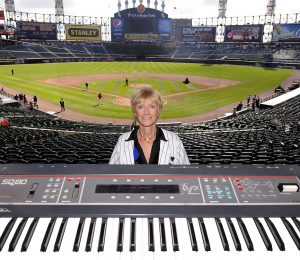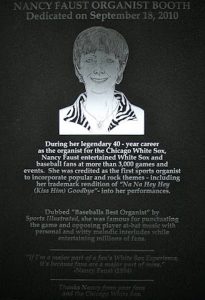With the White Sox, Nancy Faust changed the game for baseball organists
By Kevin Beese Staff reporter — June 28, 2018
Nancy Faust, who was the White Sox organist for 40 years was “without question the most famous ballpark organist of the past half-century,” according to the Baseball Reliquary. (Photo courtesy of Nancy Faust)
Oh what fun organist Nancy Faust would have with Chicago White Sox outfielder Daniel Palka if she were still putting songs to players as they came to the plate.
“I know a lot of polkas,” she quipped.
Faust, organist for the White Sox for 40 years, will be inducted into the Shrine of the Eternals on July 22 in Pasadena, Calif. The Shrine of the Eternals is the Baseball Reliquary’s equivalency to the Baseball Hall of Fame, but induction is not based on individual statistics the way the Hall is.
Faust said she never had anything scripted going into a game.
“It was spontaneous,” Faust said. “I didn’t know the names of the visiting players until I’d get to the ballpark.”
Even if Faust (or someone else) did script things, she wouldn’t be able to follow it.
“Ask me to play a song and it’s totally by ear. I can’t read music. I play it mostly from how it sounds,” Faust said. “Hum it and I can play it. I just do it.
“I am a one-trick pony. What I could do, I do. The organ was made for me. I thought I was going to major in music. I was going to learn music theory. It is what I was going to do. But I can just do it. I never assigned a name to what I did. I realized I was never going to direct a band so I switched my major to psychology.”
Faust will be joined by former White Sox pitcher Tommy John, known more for the arm surgery named after him than his pitching statistics, and the family of baseball veteran and humanitarian Rusty Staub, who died earlier this year.
Members of the Baseball Reliquary called Faust “without question, the most famous ballpark organist of the past half-century.”
She entertained fans on Chicago’s South Side from 1970 through 2010.
At the age of 23, Faust began serenading fans at Comiskey Park. She was an instant hit, supplementing the traditional organ repertoire with pop and rock themes, and linking snippets from television ads and pop music to specific players.
Some of her favorites:
- Any of the Greens who have played Major League Baseball — “I’d play ‘Green Onions,’ ‘Green-Eyed Lady,’ ‘Little Green Apples.’”
- Any players named Al — “I’d play ‘Call Me ‘Al’, ‘I’m So Sorry, Uncle Albert.’”
- Detroit Tiger Brandon Inge — “There was a playwright named “Inge,” who wrote ‘Bus Stop’ so I played that.
- Diminutive Kansas City Royal Freddie Patek — “‘Small, Small World’ and ‘Short People.’”
- Giant of a man Frank Howard — “‘I Feel the Earth Move under My Feet’ and ‘Elephant Walk.’”
- A male streaker back in the 1970s – “‘Is That All There Is’”

Longtime White Sox organist Nancy Faust will be inducted into the Baseball Reliquary’s Shrine of the Eternals on July 22. The shrine is for individuals who had an impact on the game in nonstatistical ways. (Photo courtesy of Baseball Reliquary)
It was Faust’s version of “Take Me Out to the Ball Game” that moved then-Sox announcer Harry Caray to begin leading the fans in a rollicking version of the song, an act that would later make him famous on the North Side of Chicago.
The Baseball Reliquary notes that perhaps Faust’s greatest contribution to sports history took place in 1977 when, after the South Side Hitmen demolished an opponent that she first played “Na Na Hey Hey Kiss Him Goodbye,” a 1969 tune by an ensemble called Steam.
During her 40 years with the White Sox, Faust missed only five games, and those were due to the birth of her son.
Faust also played for the Chicago Bulls and the Chicago Blackhawks.
Faust, John and Staub were the only three individuals on the 2018 ballot to get the required 25 percent of the vote.
Notable names that fell short of getting into the Shrine of the Eternals this year include broadcaster Bob Costas, manager Leo Durocher and pitchers J.R. Richard and Denny McLain.
It was Faust’s fourth year on the ballot.
She said she was thrilled with the Reliquary’s honor, noting “It’s the only organization that recognizes people who made an impact on the game, but not in traditional ways.”
Faust said she did her best to play off of whatever was happening at the ballpark. She said a player walking during an at-bat, a rain shower occurring or a player stealing a base all would generate a response from her.
“I was in my glory when I could express myself that way,” Faust said. “To spend so many years being able to do that, being around to do what I was able to do was the best.”
Faust said the time was right for her to say “goodbye” in 2010.

Nancy Faust had the White Sox organist booth dedicated in her honor in 2010. (Photo courtesy of Nancy Faust)
“With technology and the scoreboards with video replays, the organ’s role in the game became smaller and smaller,” she said. “There was a time when the organist made a big difference in the level of enjoyment for fans, for the people in the stands. It made being at the ballpark somewhat unique.”
Faust said she never heard from an opposing player about the walk-up song she provided for him.
“They were concentrating on what they were doing,” Faust said.
The Mundelein resident said the focus has changed in the past 20 years with players wanting to hear certain songs. She said the races and other entertainment between half-innings compete for time.
“There’s just not time to do too much now,” Faust said. “… The organ can still have a presence, but it’s not necessary anymore. There was more time years ago. The coach would walk out to the mound and I used to trace his steps. If there were three people meeting on the mound, I would play ‘The Good, the Bad and the Ugly,’ Faust said. “Now that time is used for a dot race or a commercial. Plus, they are trying to keep the game going now. The luxury of time is no longer there.
“Now it is more like pinball. People’s attention spans are not what they used to be.”
Faust says she misses many aspects of being at the ballpark, but none more so than the fans.
“I miss the fan camaraderie. I was accessible so I would see so many people game after game, year after year, and generation after generation.”
—- With the White Sox, Nancy Faust changed the game for baseball organists —-







